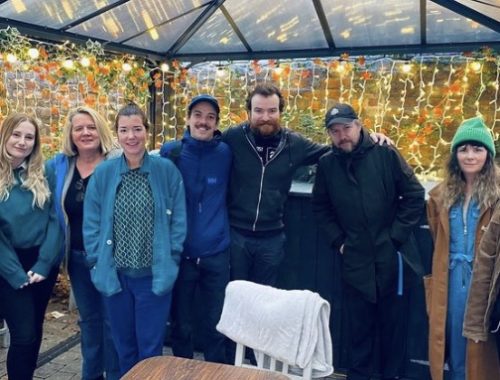AEL 3001: Blog Post 3
Taking on a work placement can be an exciting prospect, but like any new form of work, it cannot be without its challenges. To acknowledge and reflect on such problems, as well as how you encountered and overcame them is as important as reflecting on something you did well. As such, I am going to use Gibb’s Model of Reflection to analyse the difficulty of the situation I had to overcome, as well as the aftermath and how it was handled.
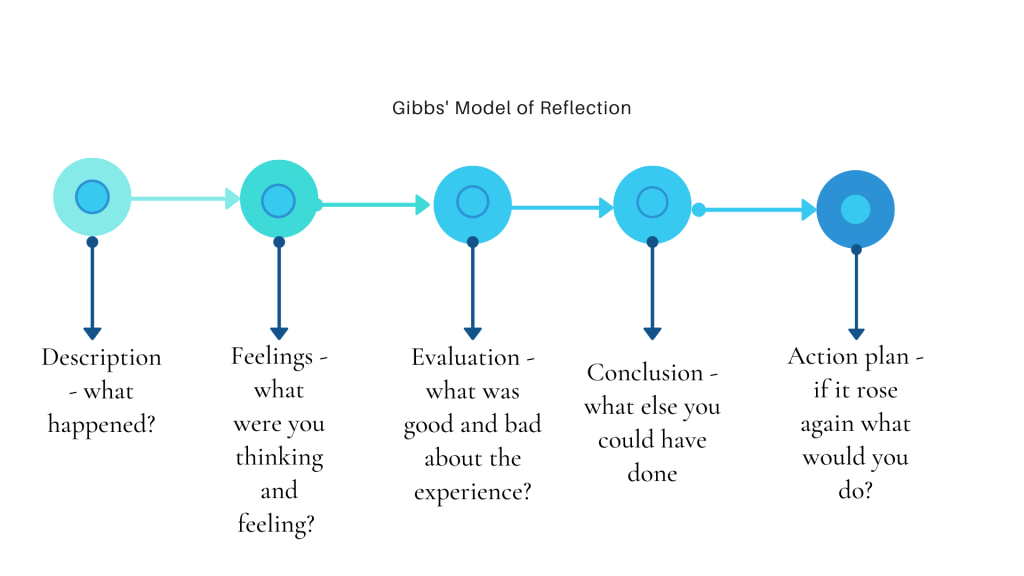
Osterman and Kottkamp see reflective practice as a way of “overcoming organizational habit and facilitating significant change” and that we learn the most from engaging with difficult experiences. (quoted in Bassot p.59) In conjunction with this, I wanted to analyse an aspect of my placement which I found quite difficult: going from university level radio packages to a professional level environment.
Due to the coronavirus pandemic, a lot of the actual practical, hands on experience was significantly diminished, so I experienced a sense of nervousness regarding the possibility of entering a professional environment. When you are producing something for an organisation, it is going out in a live broadcast and there is inherent pressure with that, and whether it is putting imaging together or whether you are speaking live on air, it was an environment that I had never encountered before.
As an active radio listener myself, I always understood the pressures of live presenting, but it is only when you are thrust into that environment that you can truly understand the depth of that pressure. Several training materials were sent to me regarding the Ofcom code, professionalism and how your voice can determine whether or not you should present (which was something I didn’t even consider at the time). I simply had to remember that any person who has ever been on radio before me would have felt the exact same.
Once I went in to do my first show with Neil (the DJ for the 7am show) I immediately felt more at ease as I came to grips with the show’s setting and running order. I was still very conscious of everything I was saying, as unlike any radio packages I had created before, there was no opportunity to stop and rerecord. So there was a sense of immediacy with the work, which albeit was daunting, proved very rewarding and allowed me to enter that space of confidence which I might not have otherwise.
The perceived benefit of internships for graduates’ employability is absolute (acquiring skills they cannot develop in formal education or in non-career paid employment) and relative (accruing additional skills, experience and networks in excess of those required to perform a standard entry-level role) (McDonald et. al 78)
Yet similarly, like any employment initiation, the will and want to fit in and be a good team player is difficult: to balance being willing without being pushy, co-operative but not overbearing, being able to work on your own without seeming stubborn. Jasper discusses how it is easy, “especially as a beginning practitioner” to allow yourself those feelings of “insecurity and wanting to fit in to influence the actions you take, rather than actually stopping to think about whether these are the best courses of action take.” (138) This was certainly something that resonated with me during the earlier months of my placement, but I found that by engaging with others in the workplace I was given a more innate sense of what it meant to be a working individual and how to adjust to those cultures: including how to interact with colleagues and superiors.
Burford et. al similarly note how “developing confidence and resilience, resolving conflict and workplace tensions, practicing discourse, and working in multidisciplinary teams” (quoted in Winchester-Seeto et. al 5) can help reduce such feelings of unease upon entering a professional space. In opposition, I already knew several members of the SARC radio team, so there was already a relationship established, so it was rather refreshing to take my skills and transfer them to a setting and to people unfamiliar to me.
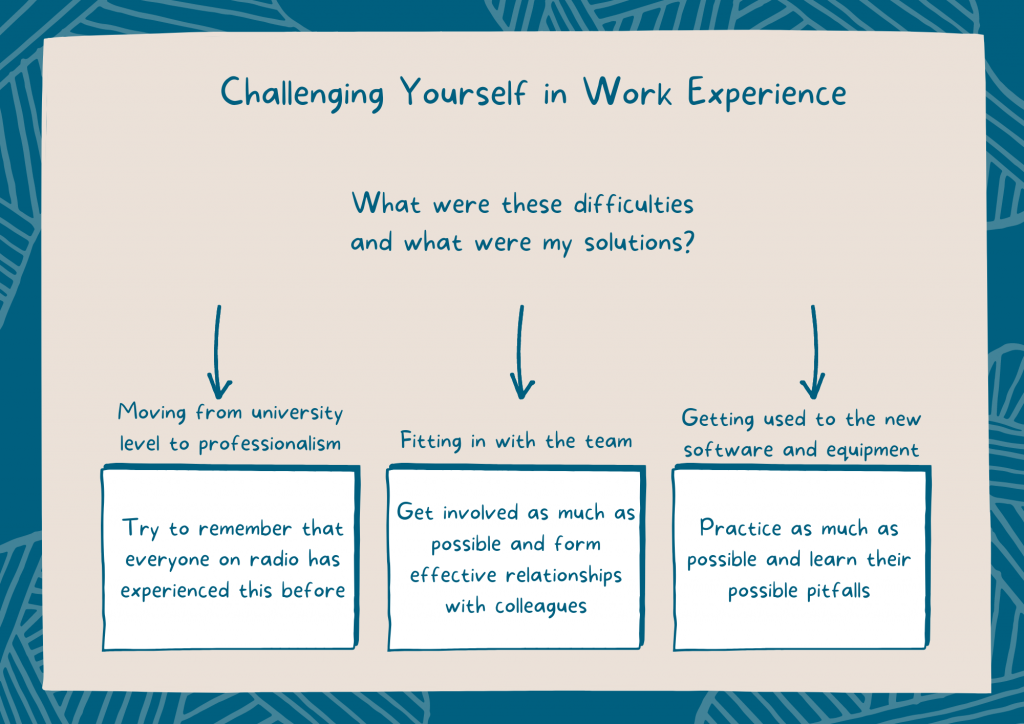
Another aspect I had to become accustomed to was the change in equipment and software. Having ingrained myself in the software used through my university experience, that switch to using the software most commonly used by a professional level organisation (Adobe Audition, which I had never used before) took some adjusting to. I learned that set up was key and that one must be paying attention at all times during a show; the whole atmosphere of a show can change depending on if “a knob or key on the mixer works loose, the software seems unreliable, the clock is not absolutely accurate, a small indicator light may blow or a headphone lead break.” (McLeish et al. 50)
As such, I tried to frequent myself with the team and the software as much as possible to try get up to speed as quickly as I could. Even though I was allowed to use whatever software I wished in my own time, I was required to use the designated software in the office spaces. Nevertheless, being granted the opportunity to get acquainted with this new software has allowed me to prepare for any future work that I may encounter that incorporates such software.
To conclude, I have found the challenges one of the many benefits of work experience has provided me with. It is through acknowledging a negative or difficult experience that can allow us to engage with and highlight the power of our positives as well.
Works Cited
Bassot, Barbara. “Learning from Positives and Negatives: Critical Incidents.” The Reflective Practice Guide: An Interdisciplinary Approach to Critical Reflection, Taylor & Francis, 2015, pp. 57–65.
Jasper, Melanie. “Ways of reflecting on your own.” Beginning Reflective Practice, Nelson Thornes, 2003, pp. 135-172.
McDonald, Paula, et al. “Challenging the Assumptions Supporting Work Experience as a Pathway to Employment.” Internships, Employability and the Search for Decent Work Experience, edited by Andrew Stewart et al., Edward Elgar Publishing Limited, 2021, pp. 76–91.
McLeish, Robert and Jeff Link. “The radio studio.” Radio Production, Taylor & Francis, 2015, pp. 28-51.
Winchester-Seeto, Theresa, and Leanne Piggott. “’Workplace’ or Workforce: What Are We Preparing Students For?” Journal of University Teaching and Learning Practice, vol. 17, no. 4, 2020, pp. 137–143.
Lets all get Involved
3rd Blog post
You May Also Like
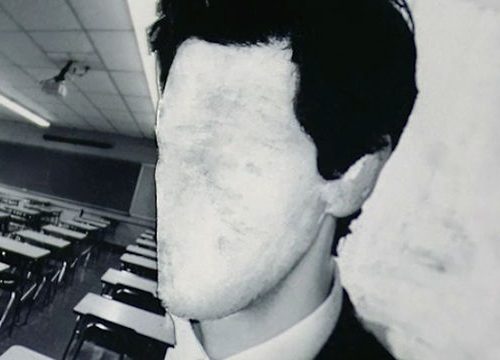
The Equity Of Detachment
25 March 2022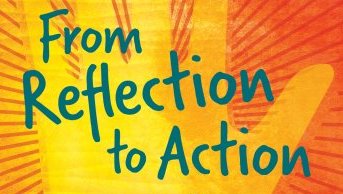
Reflection-In-Action: The Value of Challenges
25 March 2022